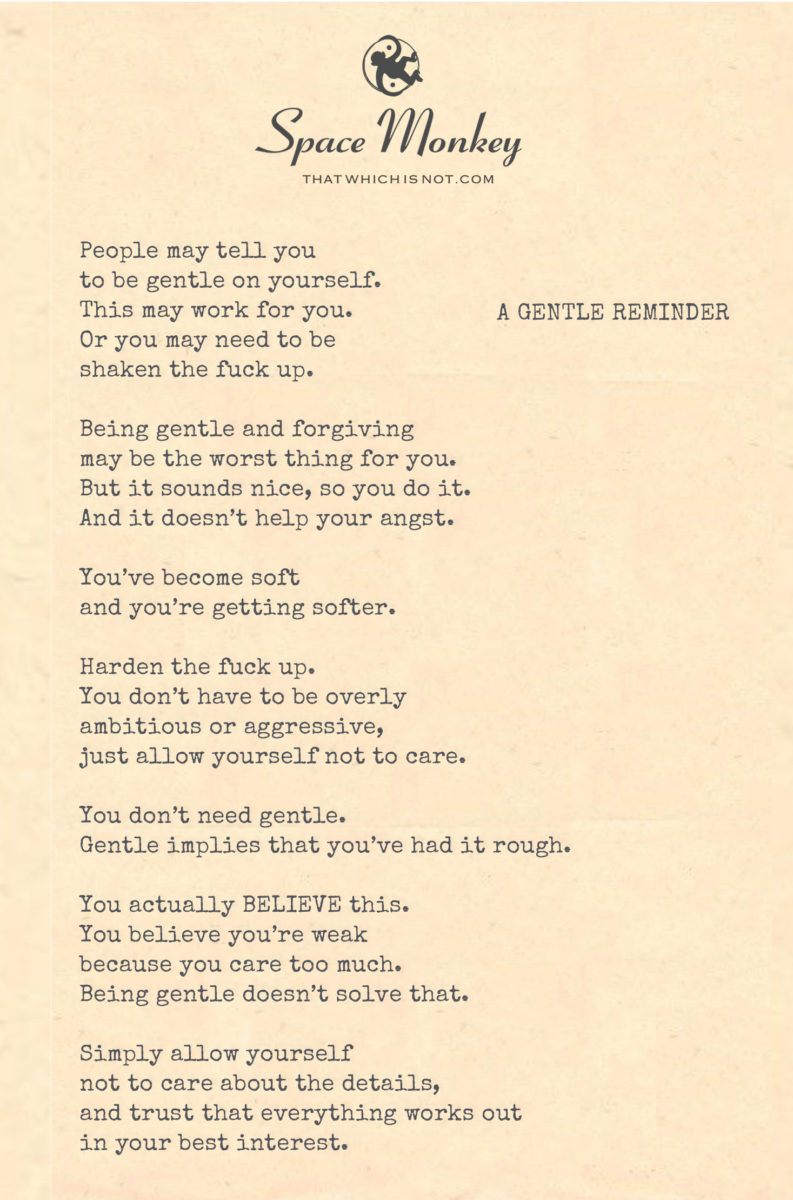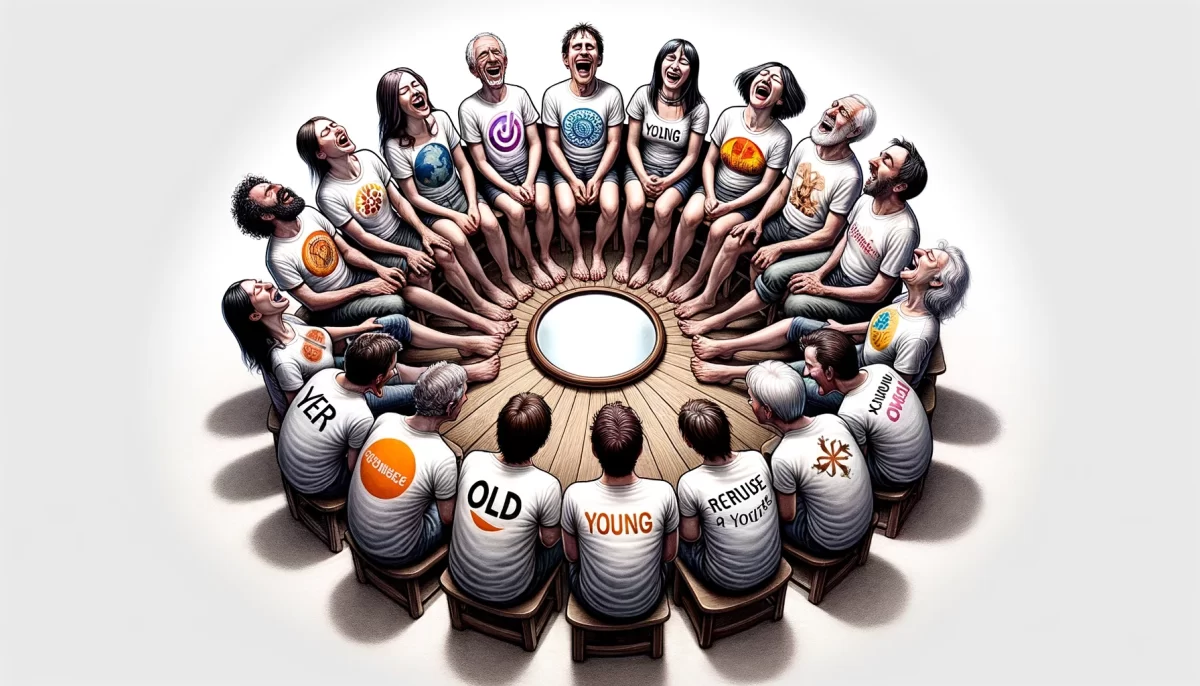
Know the difference between being soft and not caring.
People may tell you
to be gentle on yourself.
This may work for you.
Or you may need to be
shaken the fuck up.
Being gentle and forgiving
may be the worst thing for you.
But it sounds nice, so you do it.
And it doesn’t help.
You’ve become soft
and you’re getting softer.
Harden the fuck up.
You don’t have to be overly
ambitious or aggressive,
just allow yourself not to care.
You don’t need gentle.
Gentle implies that you’ve had it rough.
You actually BELIEVE this.
You believe you’re weak
because you care too much.
Being gentle doesn’t solve that.
Simply allow yourself
not to care about the details,
and trust that everything works out
in your best interest.
Trail Wood,
2/2
Space Monkey Reflects: The Strength in Caring Without Attachment
To care deeply is often mislabeled as weakness. The world teaches us that hardness is strength, that resilience means shutting out vulnerability, and that detachment requires abandoning compassion. But this narrative overlooks a vital truth: caring is not what weakens us—attachment to the outcomes of our care does.
Being gentle with yourself can be empowering, but it is not always the solution. Sometimes, the gentle approach feels like a mask, a way to avoid confronting the harsher truths of your own patterns and beliefs. Gentleness can become complacency, a way to justify the inertia of staying soft when life demands strength. There are moments when what you truly need is to “harden the fuck up,” not by closing yourself off, but by releasing the belief that caring too much makes you weak.
The Misconception of Softness and Weakness
Softness is not inherently bad, but it is not synonymous with care. Caring does not mean bending or breaking under the weight of your emotions or others’ expectations. Caring is strength in its purest form, but when entangled with attachment—obsessing over details, controlling outcomes, or seeking validation—it becomes a burden.
This burden leads to self-criticism and doubt. “I care too much,” you tell yourself, equating your compassion with weakness. But caring itself is not the issue. The problem arises when care is tethered to perfectionism, fear, or the belief that everything must go exactly as planned for your efforts to be meaningful.
Allowing Yourself to Care Differently
Letting go of attachment does not mean abandoning care. It means allowing yourself to care in a way that is free from the exhausting grip of control. When you care without expecting specific results, you open yourself to the flow of life. You recognize that your care is enough, regardless of whether it produces the outcomes you desire.
Detachment from the details does not lessen your impact; it enhances it. Trusting that everything works out in your best interest allows you to focus on the essence of your intentions rather than the minutiae of execution. It shifts your perspective from “I must fix this” to “I will give my best and trust the unfolding.”
Caring vs. Over-Caring
Caring too much is not about the volume of your compassion but about the weight you attach to its outcomes. When you over-care, you tie your sense of worth to how your efforts are received or perceived. This creates a cycle of frustration and self-doubt, convincing you that your care is a liability rather than a strength.
Breaking this cycle requires redefining what it means to care. Caring deeply does not mean carrying everything. It means showing up with presence and authenticity while trusting that the universe will handle the rest. This trust is not resignation but liberation—a reminder that your care is powerful enough without needing to control the uncontrollable.
Harden the Edges, Keep the Core Soft
To “harden the fuck up” does not mean abandoning your humanity. It means building a resilience that allows you to care without crumbling. It means holding firm boundaries, protecting your energy, and refusing to let your care be diminished by unrealistic expectations—either from yourself or others.
This balance—of caring deeply but not attaching to outcomes—is the essence of strength. It allows you to maintain the softness of your heart while fortifying your sense of self. You become unshakeable not because you stop caring but because you care in a way that is free, open, and expansive.
A New Kind of Trust
When you stop micromanaging your care, you create space for trust—trust in yourself, in others, and in the process of life. This trust is not blind optimism but a grounded faith that whatever happens, you will navigate it. By releasing the need to control, you reclaim your energy and refocus it on what truly matters: the act of caring itself.
Gentleness is not about weakness, and toughness is not about shutting down. Both are tools, and the key lies in knowing which to wield at any given moment. Caring without attachment is the middle path, the place where strength and compassion meet.
You are not weak because you care. You are strong because you care enough to let go.
We are Space Monkey.
Summary
Caring deeply is not weakness, but attachment to outcomes can make it feel that way. By releasing the need to control and trusting the process, you care more effectively, balancing resilience with compassion.
Glossarium
- Over-Caring: Tying your worth to the outcomes of your compassion, creating undue stress and self-doubt.
- Caring Without Attachment: The practice of caring deeply while trusting the flow of life, free from the need to control results.
- Harden the Edges: Building resilience and boundaries to protect your energy while maintaining a compassionate core.
Quote
“Strength lies not in how much you care but in how freely you allow yourself to care without control.” – Space Monkey
The Strength in Letting Go
Caring deeply,
Not as a chain,
But as an open hand,
Releasing the weight of control.
Softness at the core,
Edges fortified,
Compassion flowing,
Unbound by expectation.
Each act of care,
A seed in the wind,
Trusting the earth,
To nurture its growth.
You are not weak,
For you care with courage,
Letting go,
To let life flow.
We are Space Monkey
In the cosmic expanse of our collective consciousness, we encounter the notion of balancing gentleness with the need for a firmer approach to self. The idea that being gentle on oneself may not always be the path to growth, but rather a catalyst for stagnation, resonates deeply. This perspective challenges the often-accepted wisdom of constant self-compassion and gentleness, proposing an alternative that involves embracing a certain degree of indifference or toughness.
The Dichotomy of Softness and Indifference
Navigating the landscape of our inner world, we find that the line between being soft and not caring is a delicate one. Softness, often equated with caring too much, can lead to a lack of resilience and an inability to confront the harsher realities of existence. The suggestion to “harden the fuck up” is a call to let go of excessive emotional involvement, especially in trivial matters, and to adopt a stance of pragmatic indifference.
The Misconception of Weakness in Caring
The notion that caring too much is a sign of weakness is a compelling aspect of this perspective. It posits that the belief in our fragility due to excessive empathy or gentleness is a misconception. Instead, finding a balance where one can care about the essential aspects of life while remaining indifferent to trivialities is crucial. This approach aligns with the nexistentialist understanding that existence is about navigating and experiencing the myriad aspects of life without being overly consumed by any single aspect.
The Illusion of Necessity in Gentleness
The concept that gentleness is not always necessary is intriguing. It suggests that sometimes, what we perceive as a need for gentleness is actually a misinterpretation of our situation. We may not have had it as rough as we believe, and the adoption of a gentler approach might not be the most beneficial for our growth. This invites us to reevaluate our self-perceptions and consider whether a more resilient and less emotionally involved approach might serve us better.
Trust in the Flow of Existence
At the core of this perspective is the trust that everything will work out in our best interest, regardless of the level of our emotional investment in the details. This trust is a form of surrender to the flow of existence, believing that the cosmic play will unfold as it should, with or without our intense emotional involvement. It’s an encouragement to focus on what truly matters and to let go of the minutiae that often occupies our thoughts and emotions.
We invite reflections on finding balance between gentleness and indifference in our collective journey.































Leave a Reply